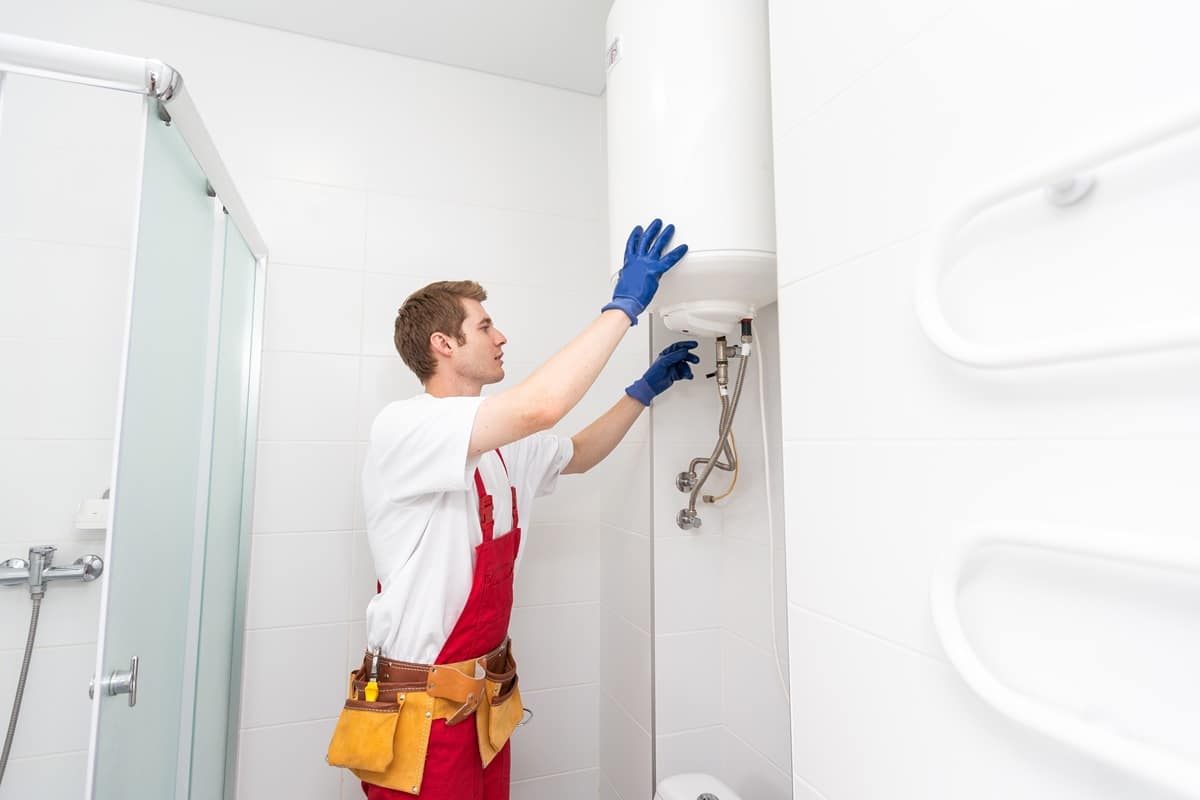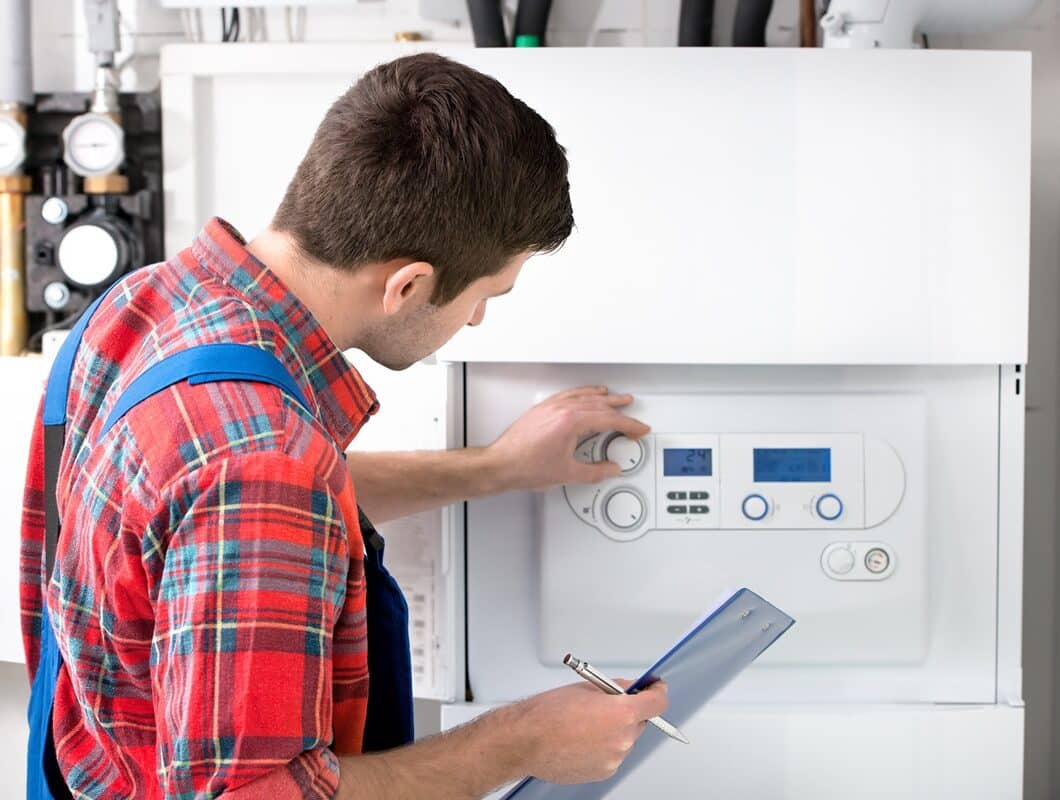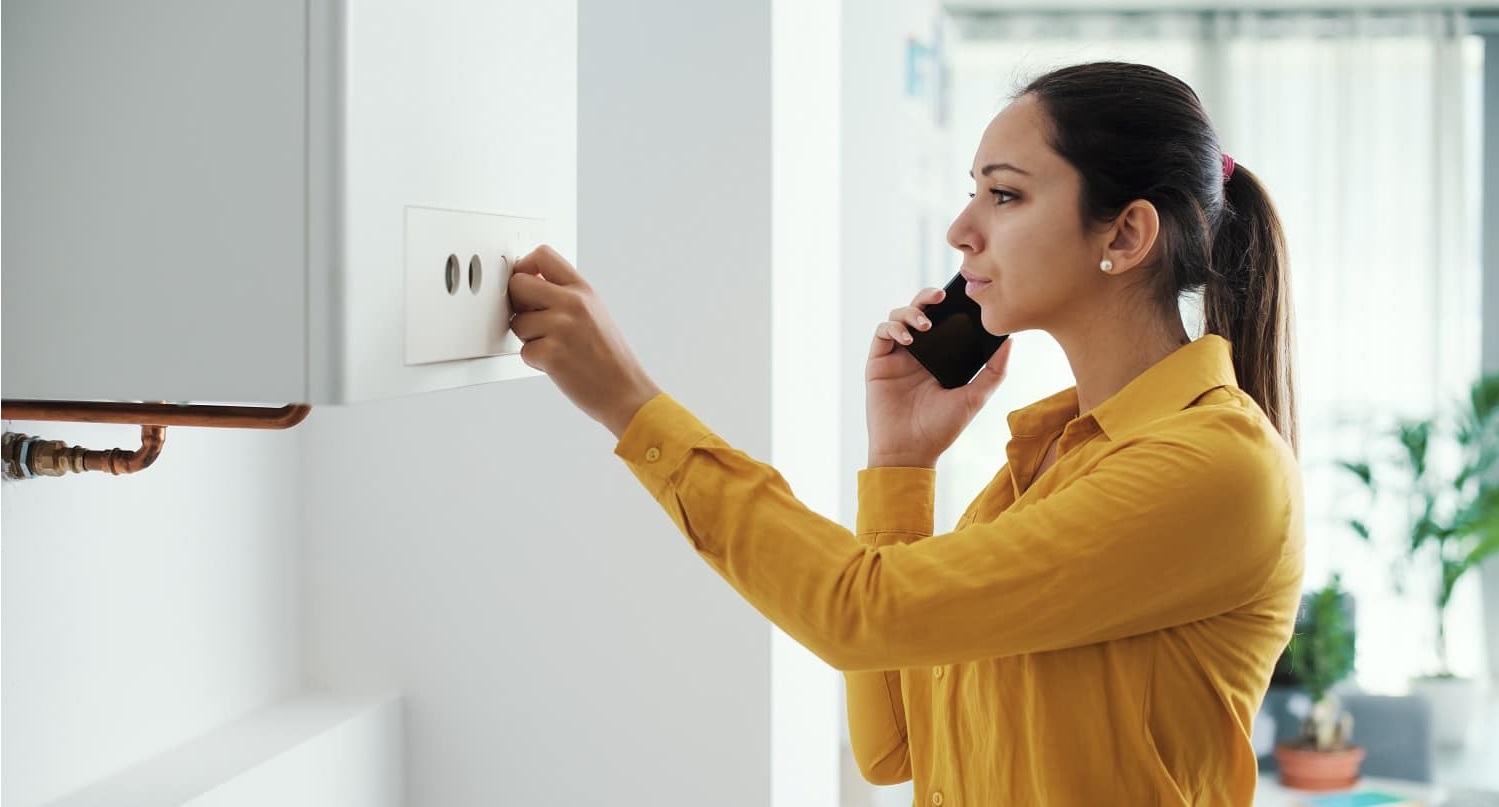 Troubleshooting Common Boiler Issues: Where to Start?
Troubleshooting Common Boiler Issues: Where to Start?

When you’re faced with a malfunctioning boiler, it’s crucial to approach the situation methodically to diagnose the issue effectively. Before you consider calling a professional, there are several initial checks you can perform that may resolve simpler problems or provide valuable information to a technician later on.
Initial Boiler Checks
- Inspect the Thermostat: Ensure it’s set correctly and functioning. A miscommunication between your boiler and thermostat can often mimic more serious issues.
- Check the Pressure Gauge: Your boiler’s manual will indicate the optimal pressure range. If it’s too low or high, this could be the root of your heating woes.
- Power Supply: Verify that there are no issues with your boiler’s electrical supply, such as tripped fuses or switched-off power.
Safety First: When to Avoid DIY Fixes
Do not attempt to fix any gas-related components or anything that requires the removal of your boiler’s cover; these tasks are strictly for Gas Safe registered engineers. If you smell gas or suspect a leak, immediately shut off your gas supply and contact emergency services.
The Benefits of Understanding Your Boiler
By familiarising yourself with common boiler issues, you can save time and potentially money by identifying simple fixes or providing detailed information to our engineers at Plumbers 4U. This knowledge empowers you to make informed decisions about when to tackle a problem yourself and when to seek our expert services.
No Heat or Hot Water: Pinpointing the Culprit
When you’re faced with a boiler that’s not delivering heat or hot water, it can be more than just an inconvenience; it can disrupt your daily routine. Understanding why this happens is the first step in finding a solution. Let’s explore the common reasons and troubleshooting steps you can take.
Identifying the Issue: Thermostat vs. Boiler
Before you consider calling a professional, there are a few checks you can perform:
- Check the Thermostat: Ensure it’s set to the correct temperature and mode. If it’s battery-operated, it might just need new batteries.
- Boiler Pressure: Verify that the boiler pressure is within the recommended range. Low pressure can affect its ability to heat water.
- Power Supply: Confirm that there are no issues with the electrical supply to the boiler.
Troubleshooting Steps
If the basic checks don’t resolve the issue, here’s what you can do next:
- Reset the Boiler: Sometimes, simply resetting the boiler can clear any temporary faults.
- Check for Error Codes: Modern boilers display error codes that can help pinpoint the problem.
- Pilot Light: For older boilers, ensure the pilot light is lit. If it’s out, follow the manufacturer’s instructions to relight it safely.
Could It Be a Larger Issue?
Persistent problems with no heat or hot water could indicate a more significant issue within your heating system, such as a failed component or a blockage. If the simple fixes don’t work, it’s time to call in the experts. At Plumbers 4U, we’re equipped to diagnose and resolve complex boiler issues, ensuring your comfort and safety.
unravelling the Mystery of Boiler Leaks
Discovering a leak in your boiler system can be alarming. Leaks can cause significant damage to your home and can also be a symptom of underlying issues with your boiler. At Plumbers 4U, we understand the urgency and provide guidance on how to address this problem effectively.
Common Causes of Boiler Leaks
Leaks in your boiler system can arise from several sources:
- Corrosion: Over time, water can corrode the metal components of your boiler, leading to leaks.
- High Pressure: Excessive pressure can strain the boiler’s components, causing them to leak.
- Seal and Gasket Failure: Worn-out seals or gaskets can give way, resulting in water escaping from the boiler.
- Component Defects: Faulty components, such as valves or pumps, can also be the culprits.
Identifying the Leak Source
To locate the source of the leak:
- Inspect Visible Pipes: Check for any signs of water around the pipes and boiler.
- Look for Drips: Follow any water trails to find where they originate.
- Check the Pressure Gauge: A high reading may indicate a pressure-related leak.
Immediate Actions for Leak Discovery
If you find a leak:
- Turn Off the Boiler: To prevent further damage, switch off your boiler immediately.
- Close the Water Supply: This will stop the flow of water and minimise the leak.
- Contact Us: Reach out to our team for a swift response and professional repair.
The Impact of Leaks on Efficiency and Safety
Leaks can reduce the efficiency of your boiler by causing it to work harder to heat your home, leading to increased energy bills. Moreover, water damage can pose safety risks and lead to costly repairs. It’s crucial to address leaks promptly to maintain the safety and efficiency of your boiler system.
Silence the Bangs: Addressing Boiler Noises
Boiler noises can be disconcerting and may signal the need for maintenance or repair. At Plumbers 4U, we’re here to help you understand what these sounds mean and how to address them.
Deciphering Boiler Sounds
Different noises can indicate various issues within your boiler:
- Whistling often points to ‘kettling’, which is usually caused by limescale build-up.
- Banging could suggest air in the system or rapid heating and cooling of the pipes.
- Gurgling might be due to a frozen condensate pipe or air in the system.
Resolving Unusual Noises
To tackle these unsettling sounds:
- Descale Your Boiler: If you suspect limescale, a descaling agent or a professional power-flush may be necessary.
- Bleed Your Radiators: This can release trapped air, eliminating banging noises.
- Insulate Pipes: To prevent gurgling from a frozen condensate pipe, proper insulation is key.
recognising When to Be Concerned
While some noises can be fixed with simple DIY solutions, others may require professional attention. Persistent or loud noises, especially those that come on suddenly, should not be ignored. They could indicate a more serious issue, such as a pressure imbalance or a failing component.
Urgent Noises Demand Professional Expertise
If boiler noises persist after you’ve tried basic troubleshooting, it’s time to call in the experts. We at Plumbers 4U are equipped to handle urgent problems, ensuring your boiler operates safely and efficiently. Don’t hesitate to reach out if you’re concerned about the sounds your boiler is making.

Pressure Problems: Low and High Boiler Pressure
Maintaining the correct pressure is crucial for your boiler’s operation. If you’re noticing issues with heating or hot water, it could be a pressure problem. Let’s walk through how to identify and resolve pressure issues in your boiler.
Checking Your Boiler’s Pressure
Firstly, locate the pressure gauge on your boiler. The normal pressure range is typically between 1 and 2 bars. If the needle is below 1, your boiler pressure is too low. Conversely, if it’s above 2, the pressure is too high.
Adjusting Boiler Pressure
To adjust the pressure:
- Increasing Pressure: Open the filling loop valves to allow water into the system, watching the gauge until it reaches the recommended level, then close the valves.
- Reducing Pressure: If the pressure is too high, you might need to bleed your radiators to release excess water from the system.
Understanding Pressure Fluctuations
Pressure fluctuations can be caused by:
- Leaks: Even small leaks can affect pressure, so check for any signs of water.
- Faulty Valves: A failing pressure relief valve can lead to high pressure and needs professional replacement.
The Importance of Optimal Pressure
Keeping your boiler at the right pressure is not just about immediate performanceit also affects the longevity of your system. Regularly monitoring and adjusting the pressure can prevent strain on your boiler, helping to avoid costly repairs and extend its lifespan.
At Plumbers 4U, we’re committed to helping you maintain your boiler at peak efficiency. If you’re unsure about adjusting the pressure yourself, we’re just a call away to assist you.
The Pilot Light Puzzle: Keeping the Flame Alive
Experiencing issues with your pilot light can be frustrating, especially when it repeatedly goes out. At Plumbers 4U, we understand the importance of a reliable boiler, and we’re here to guide you through solving pilot light problems.
Understanding Pilot Light Outages
A pilot light that frequently extinguishes can be caused by several factors:
- Faulty Thermocouple: This safety device shuts off the gas if the pilot light goes out. If it’s malfunctioning, it may cut the gas supply prematurely.
- Dirty Pilot Tube: A clogged pilot tube can prevent gas from reaching the pilot light.
- draughts: Sudden draughts can blow out the pilot light.
Safety First: Dealing with Pilot Lights
When addressing pilot light issues, safety is paramount:
- Gas Leak Check: Before attempting to relight the pilot light, ensure there are no gas leaks.
- Ventilation: Keep the area well-ventilated to prevent gas build-up.
Relighting Steps
To relight the pilot light:
- Consult Your Boiler Manual: Follow the manufacturer’s instructions carefully.
- Turn Off the Boiler: Wait for a few minutes to let any gas clear.
- Ignite the Pilot: Use the ignition sequence as directed in your manual.
Knowing When to Call a Professional
If the pilot light won’t stay lit or you’re unsure about the process, it’s time to call in the experts. Our Gas Safe registered engineers are trained to handle these issues safely and efficiently.
Long-Term Solutions
For recurrent pilot light issues, we can assess your boiler to determine if there’s a need for part replacements or adjustments to the system. Ensuring your boiler is serviced regularly can also prevent future pilot light problems.
Radiator Reflections: Cold Spots and Inefficiency
Experiencing cold spots on your radiators can be a sign that they’re not operating efficiently. At Plumbers 4U, we understand how essential it is for your comfort and energy bills to have a fully functioning heating system. Let’s delve into the common causes and solutions for radiator inefficiency.
Diagnosing Uneven Radiator Heating
If your radiators are not heating up evenly or at all, it could be due to:
- Trapped Air: This can prevent hot water from circulating properly.
- Sludge Build-up: Over time, debris can accumulate in your radiators, causing blockages.
Bleeding Your Radiators
Bleeding your radiators is a simple process that can often resolve cold spots:
- Turn Off Your Heating: To avoid injury and ensure an accurate bleed.
- Locate the Bleed Valve: Usually found at the top side of the radiator.
- Use a Radiator Key: Insert and turn anti-clockwise to release trapped air until water starts to dribble out.
The Role of Power-Flushing
A power-flush is a more thorough solution for persistent cold spots caused by sludge. It involves:
- Flushing the System: A powerful flow of water and cleaning agents is sent through the radiators to clear out debris.
- Improving Efficiency: This process can enhance the performance and lifespan of your heating system.
Assessing Radiator Replacement
If bleeding and power-flushing don’t improve the situation, it might be time to consider:
- Upgrading Radiators: Newer models are more efficient and can heat your home more effectively.
- Consulting with Our Experts: We can advise on the best options for your home and provide professional installation services.
Frozen Condensate Pipe: Thawing Out the Problem
During the cold winter months, a common issue you might encounter is a frozen condensate pipe. This can cause your boiler to shutdown, leaving you without heat or hot water at a time when you need it most. At Plumbers 4U, we’re here to guide you through identifying and resolving this issue.
Spotting the Signs of a Frozen Pipe
You can tell if your condensate pipe is frozen if:
- Your Boiler Displays an Error Code: Many modern boilers will show a specific code indicating a frozen condensate pipe.
- Gurgling Noises: These sounds can come from the boiler or the pipe itself.
- No Heat or Hot Water: If your boiler fails to start, a frozen pipe could be the culprit.
Safe Thawing Techniques
To safely thaw your condensate pipe:
- Apply Warm Cloths: Soak a cloth in warm water and wrap it around the pipe.
- Use a Hot Water Bottle: Place it against the pipe to gradually melt the ice.
- Never Use Direct Heat: Avoid open flames or boiling water, as these can damage the pipe.
Preventing Future Freezes
To prevent your condensate pipe from freezing again:
- Insulate the Pipe: Use foam tubing or lagging, which can be found at most hardware stores.
- instal Trace Heating: This is an electrical heating element that runs alongside the pipe to keep it warm.
Understanding Error Codes
If you’re faced with error codes:
- Consult Your Boiler Manual: It will have specific instructions related to the displayed code.
- Contact Us: If you’re unsure about the meaning of an error code or how to address it, our experts are ready to help.
Thermostat Troubles: Ensuring Accurate Communication
A thermostat is your boiler’s communicator; it tells the boiler when to heat your home based on the temperature you desire. If this communication breaks down, you may find yourself in a chilly situation. Let’s troubleshoot your thermostat to ensure it’s sending and receiving the right signals.
Diagnosing a Faulty Thermostat
To determine if your thermostat is the issue:
- Check the Display: A blank screen or unresponsive buttons could indicate a problem.
- Temperature Inconsistencies: If the actual room temperature doesn’t match the thermostat setting, it may be faulty.
- Response Delay: A delay in heating after adjusting the thermostat could signal miscommunication with the boiler.
Resetting Your Thermostat
If you suspect a miscommunication:
- Consult the Manual: Each thermostat has a specific reset procedure.
- Power Cycle: Turn off the thermostat, wait a minute, and turn it back on.
- Reprogram: If it’s programmable, re-enter your settings according to the manual.
Considering a Replacement
When to replace your thermostat:
- Persistent Issues: If problems continue after troubleshooting, a replacement may be necessary.
- Upgrading: Consider smart thermostats for enhanced control and efficiency.
The Role of a Thermostat in Boiler Efficiency
A well-functioning thermostat helps maintain an efficient heating system by:
- Regulating Temperature: It ensures your boiler works only when needed.
- Energy Savings: Accurate temperature control can lead to lower energy bills.
At Plumbers 4U, we can help you select and instal the right thermostat for your system, ensuring optimal communication and efficiency.
recognising When to Seek Professional Boiler Services
Understanding when to handle boiler issues yourself and when to call in the experts is crucial for maintaining your system’s safety and efficiency. There are certain boiler problems that are best left to the professionals due to the complexity and potential safety risks involved.
Identifying Non-DIY Boiler Issues
For your safety and to prevent further damage to your boiler, you should avoid attempting to fix the following issues yourself:
- Gas Leaks: If you smell gas or suspect a leak, evacuate the area and contact emergency services immediately.
- Electrical Faults: Any problems that may involve the electrical components of the boiler should be handled by a qualified technician.
- Internal Component Replacement: Replacing parts inside the boiler can be complex and requires a thorough understanding of the system.
Finding a Qualified Engineer
When searching for a Gas Safe registered engineer:
- Check Credentials: Ensure they are listed on the Gas Safe Register, which is a legal requirement for anyone working on gas appliances.
- Seek Recommendations: Ask for referrals from friends or check online reviews for reputable engineers.
Providing Essential Information
To help our engineers provide efficient service, please be ready to provide:
- Boiler Make and Model: This helps us prepare the necessary tools and parts.
- Error Codes: If your boiler has a digital display, note any error codes.
- Symptoms: Describe what the boiler is doing, or not doing, so we can diagnose the issue quickly.
Our Commitment to Quality and Compliance
At Plumbers 4U, we pride ourselves on providing high-quality service that complies with all safety and industry standards. Our engineers are Gas Safe registered and committed to delivering reliable and compliant boiler solutions. Trust us to handle your boiler concerns with the utmost professionalism and expertise.

Enhancing Boiler Longevity: Maintenance and Efficiency Tips
Regular maintenance is the key to extending the life of your boiler and ensuring it runs efficiently. At Plumbers 4U, we recommend a series of practices that can help you keep your boiler in top condition.
Regular Maintenance Checks
To maintain your boiler’s health:
- Annual Servicing: Have a Gas Safe registered engineer inspect and service your boiler yearly.
- Pressure Checks: Monitor the pressure gauge regularly and repressurize your system if needed.
- Bleed Radiators: Release trapped air from your radiators to improve heat distribution.
Adopting Energy-Efficient practices
Energy efficiency not only extends your boiler’s life but also reduces your energy bills:
- Thermostat Management: Keep your thermostat at a consistent temperature to avoid overworking your boiler.
- Insulation: Properly insulating your home and pipes keeps heat in, reducing the workload on your boiler.
recognising Signs for More Than Maintenance
Be aware of these indicators that your boiler may need more than just routine maintenance:
- Frequent Breakdowns: If repairs become more common, it might be time for a replacement.
- Strange Noises: Persistent noises can signal internal issues that need professional attention.
maximising Boiler Efficiency
To ensure your boiler operates efficiently:
- Use a Magnetic philtre: This device captures any debris within the system, preventing blockages.
- Upgrade to a Smart Thermostat: Gain better control over your heating and make adjustments for optimal efficiency.
By following these tips and recognising when to seek our professional services, you can ensure your boiler remains a reliable source of warmth for your home.
Ready to Resolve Your Boiler Issues? Contact Us
Experiencing boiler troubles can be stressful, but you’re not alone. At Plumbers 4U, we’re dedicated to providing immediate and effective assistance to restore warmth and comfort to your home.
How to Reach Plumbers 4U for Immediate Assistance
If you need help right away:
- Call Our Hotline: Our team is available 24/7 at 020 3582 0420 to respond to your emergency needs.
- Online Contact Form: You can also reach us through our website’s contact form for a prompt reply.
What to Expect from Our Boiler Troubleshooting Service
When you contact us for boiler troubleshooting:
- Prompt Response: We understand the urgency and will respond quickly to your call.
- Expert Diagnosis: Our Gas Safe registered engineers will diagnose the issue with precision.
- Transparent Communication: We’ll explain the problem and the necessary steps to fix it, ensuring you’re fully informed.
Tailored Solutions for Your Specific Boiler Issues
Every boiler and home is unique, which is why we:
- personalise Our Approach: We consider your specific boiler model, the nature of the issue, and your home’s heating requirements.
- Offer customised Advice: Our solutions are not one-size-fits-all; we provide advice tailored to your situation.
Choosing Plumbers 4U for Reliable and Professional Services
Selecting Plumbers 4U means:
- Trusted Expertise: With over a decade of experience, we’re equipped to handle any boiler issue.
- Certified Excellence: Our engineers are not only Gas Safe registered but also backed by ISO certifications and Safe Contractor approvals.
- Customer Satisfaction: We’re committed to delivering the highest standard of service, ensuring your complete satisfaction with our work.

